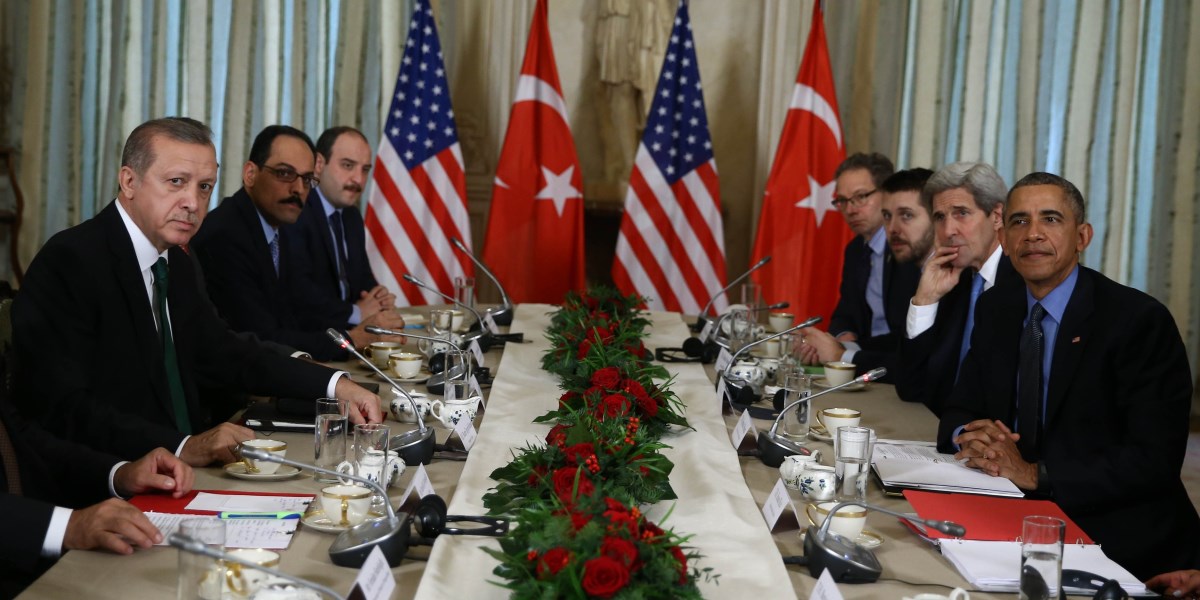
Why is Anti-Americanism on the Rise in Turkey?
The open support the U.S. is giving to a terrorist organization in Syria that has been active in Turkey for the last 30 years is creating serious questions in the minds of Turkey's political elite
Share
A great majority of the political elite in Turkey today are asking if the U.S. is truly Turkey's ally. Those who ask this of course know that every country looks out for their own interest in foreign policy, and that in the new period long-term alliances have become less important compared to ensembles of strategic interest in micro areas. Alongside this, they also know that in the international order from which the U.S. came forward as the global actor in the post-1945 period, Turkey developed an alliance with the U.S. and that the U.S. also pays attention to Turkey's regional sensibilities. Additionally, they observe that this is the first time the U.S. has been so apathetic to Turkey's regional sensibilities and that the U.S. is very openly taking steps that are detrimental to Turkey's interests and security. The open support the U.S. is giving to a terrorist organization in Syria that has been active in Turkey for the past 30 years is creating serious questions in the minds of Turkey's political elite.
Alongside the U.S. ammunition and weapons support given over the past two years to an affiliate of the Kurdish Communities Union (KCK), which we call the "PKK of Syria," the Democratic Union Party (PYD) and its armed People's Protection Units (YPG), and the legitimate international space the U.S. has created for this organization has directly affected Turkey's political stability. The PKK broke off the reconciliation process that had been ongoing with the government because Ankara would not recognize the status the PYD had reached in Syria and brought out their weapons again. The PKK, thinking it had U.S. support in Syria, was involved in many terrorist attacks that resulted in the deaths of hundreds of people in Turkey. However, the Ankara bombing that occurred this past week and resulted in the deaths of 29 people was the final straw. This terror attack, demonstrating the unification of the PKK and YPG, drew Turkey's political elites' attention to the U.S.'s policies on the PKK and YPG.
The U.S., however, continued to express its argument that the PKK and YPG are different organizations and would continue to support the YPG "in the context of the struggle against DAESH" in the field. At the point to which we have arrived, this argument is no longer believable for Turkey's political elite, and has actually become insulting. This is not the case only for political elites, as it applies to a majority of Turkey's population as well.
The U.S.'s behavior is causing a negative impression not just among political elites, but throughout Turkish society, as well. As a sociologist, I can easily say that anti-Americanism is steadily rising in Turkish society. This is the point the Americans do not realize. The anti-Americanism that had been going on within an irrational basis was considerably neutralized after 2002 with the Justice and Development Party (AK Party) rationalizing the socio-political basis under the leadership of then Prime Minister Recep Tayyip Erdoğan. After this period, being anti-American lost its specialty of forming an identity in the Turkish political arena. After 2002, the image of the West normalized in general while the image of the U.S. was rationalized, in particular by the Turkish public. Accordingly, the U.S. was no longer regarded as an imperialist force, but rather as a global hegemonic power that might have some problems and mistaken policies at certain times.
However, the U.S.'s support of Syria's PKK for the past two years has negatively affected the U.S.'s image in Turkey to the extreme. The U.S. came to be seen as an actor actively supporting a terror organization that is Turkey's enemy. Above all, the U.S. administration remaining so apathetic after the Ankara attack and continuing to stand behind the YPG awakened anti-American feelings in the public to such a degree that political elites were compelled as well.
The U.S.'s image in Turkish society is spoiling due its disregard of Turkey's struggle against the PKK terrorist organization and its behavior that makes one think it is opening the way for these terror groups, and anti-Americanism is rising. If the U.S. does not pay attention to this, none of the political actors in Turkey, the AK Party, Republican People's Party (CHP), Nationalist Movement Party (MHP) or any other actor, will be able to turn this rising tide of anti-Americanism around. I do not think I need to add that the military and other non-political actors are also included in this.
[Daily Sabah, February 26, 2016]
Tags »
Related Articles








